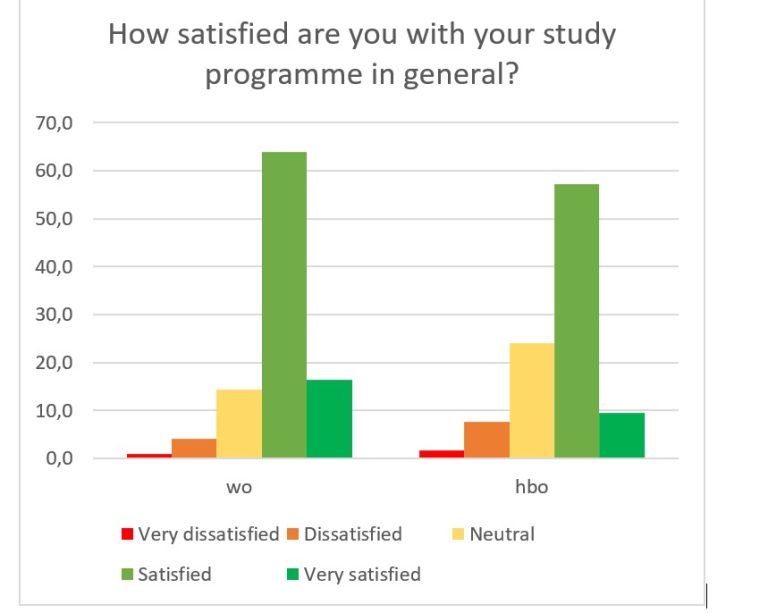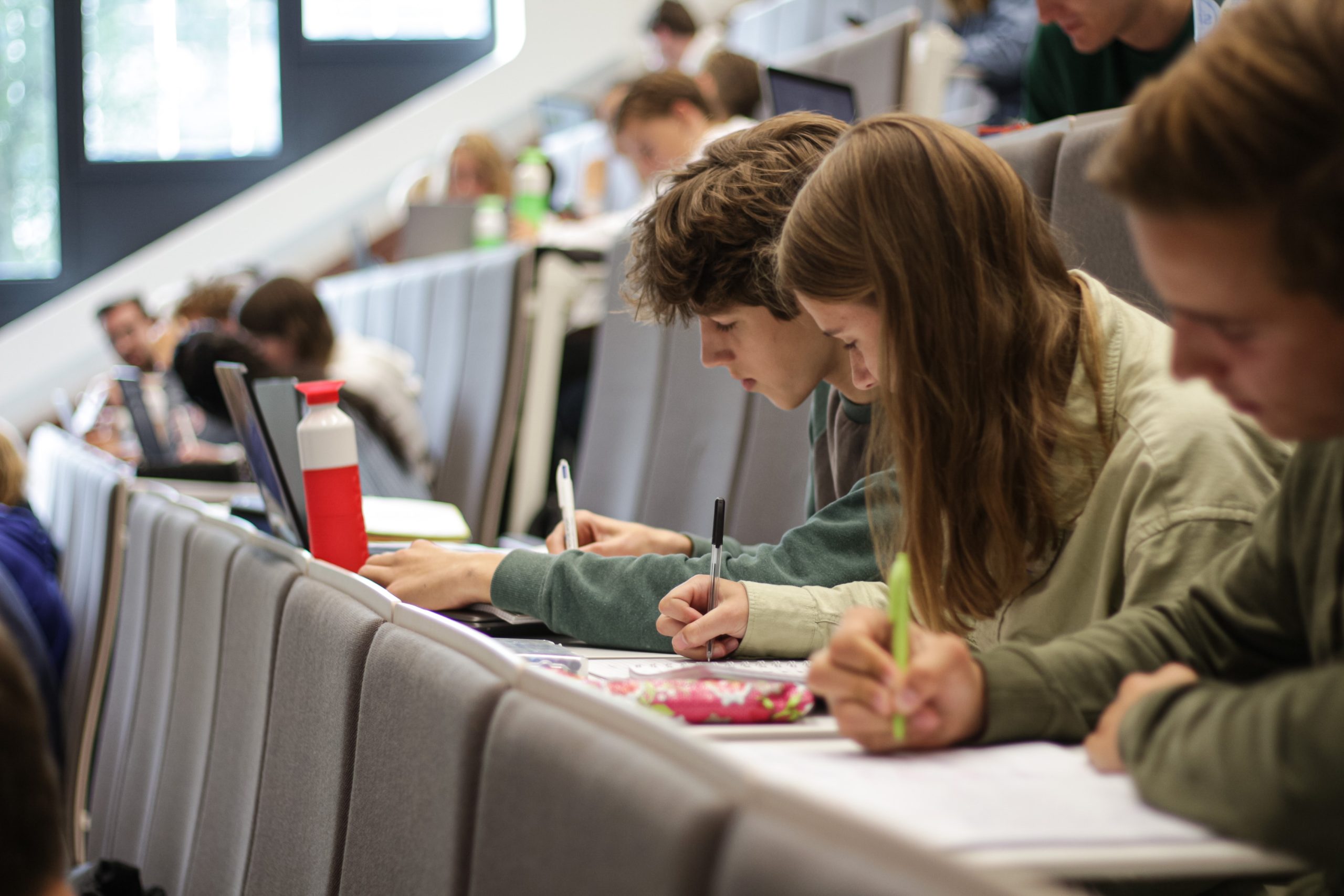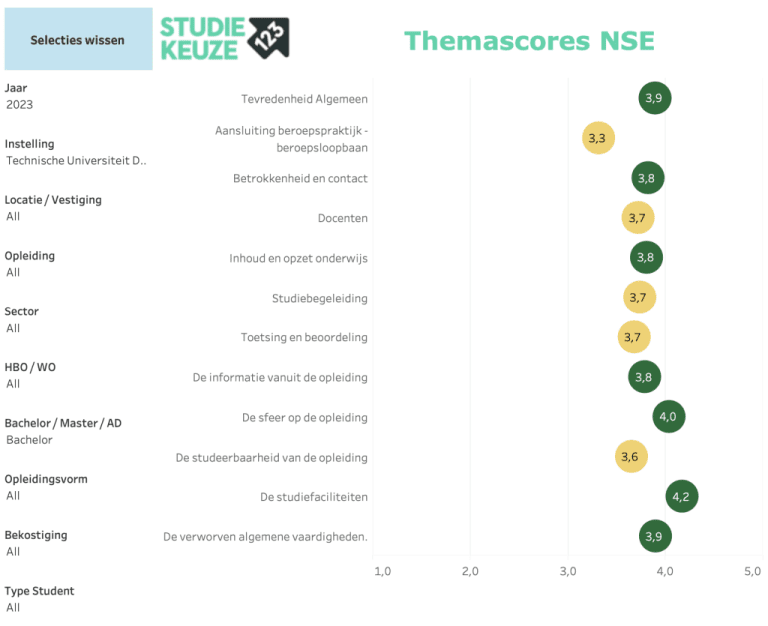The majority of students at Dutch universities think their work load is just right, the National Student Survey NSE shows. In Delft, half think the study pressure is too high.
At universities, over eighty per cent of students are satisfied or even very satisfied with their education. (Photo: Justyna Botor)
How satisfied are students with their study programme, lecturers, tests and facilities? More than 289,000 students in higher education completed the National Student Survey this year.
At the research universities more than 80 percent of the students are satisfied or very satisfied with the study programme ‘in general’, while only 5 percent of them are (very) dissatisfied.
TU Delft students’ satisfaction with 12 topics on a scale of 1-5. (Data and illustration: National Student Survey NSE)
TU Delft students are particularly pleased with the atmosphere on the campus, the study facilities and the general skills acquired. They are less happy about the study programme’s studyability and its connection to professional practice.
The rating given for the universities of applied sciences is lower. Of the students at the universities of applied sciences, 67 percent are satisfied or very satisfied with the study programme in general. Nine percent are dissatisfied and almost one in four students are neither satisfied nor dissatisfied.
Students in agricultural study programmes from both higher professional education and academic education are the most satisfied with their programme. The study programmes in the education sector and in economics get the lowest ratings.


© HOP. Bron: NSE 2023
Academic workload
The survey also asked about academic workload. Nationally, just under 40% of students think the workload is too high. In Delft, this is true for 52%. Nationally, 55% find the study pressure just right, in Delft this is much lower at 43%. Very few students find the study pressure too low (6% average in the Netherlands and 4% at TU Delft). Incidentally, the NSE hasn’t asked how many hours students spend on their studies.
Commitment
Studiekeuze123, the foundation that organises the survey on behalf of the Ministry of Education, points out the relatively high scores for atmosphere and commitment. For instance, 85 percent of the students agree with the statement ‘I feel it is safe to be myself at my university’, as opposed to 4 percent that disagree. “This shows that the majority of students feel comfortable in their study programme”, in the view of Managing Director Ingrid Kolkhuis Tanke.
Students are less satisfied with the information they get from their study programme: 14 percent (one in seven students) say they are dissatisfied, even though the majority are positive.
“Dissatisfaction on this topic among Bachelor’s students at the universities of applied sciences appears to grow the longer they study”, writes Studiekeuze123. Thirteen percent of the freshers at the universities of applied sciences are dissatisfied, as opposed to 22 percent of the fourth-year students.
Covid-19
The coronavirus crisis caused a big rise in student dissatisfaction and higher education has not yet recovered from it. Before the coronavirus crisis, 84 percent of the research university students and 73 percent of the students at the universities of applied sciences were satisfied with their study programme ‘in general’.
The survey was modified in 2021, so most of the results are no longer comparable, but the first question ‘How satisfied are you with your study programme in general?’ is still virtually the same. Previously, the scores were 4 to 5 percentage points higher.
Strong and weak points
The results of the NSE appear on the website Studiekeuze123.nl, where youngsters can explore the potential choice of study programme. The weekly magazine EW (formerly Elsevier) and the Keuzegids base themselves on the results.
The student survey is controversial because the results lead to rankings. Critics wonder what those students’ opinions actually say about the quality. And how effectively can the scores of two study programmes be compared?
Moreover, in the past there were problems with conducting the survey, which lead to reluctance at the institutions. Shortly before the coronavirus crisis, the universities of applied sciences did not take part for one year. The government at the time subsequently made participation compulsory.
- Want to know more? Take a look at the NSE dashboard
- The Delft data were provided by Ted Barendse, information officer at TU Delft.
- CBS found more stress among students during corona.
HOP, Bas Belleman / Delta, Jos Wassink
Translation: Taalcentrum-VU
Do you have a question or comment about this article?
redactie@hogeronderwijspersbureau.nl



Comments are closed.